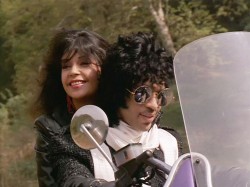Cinema | May 11th, 2016

Following the death of Prince on April 21, 2016, televised and theatrical screenings of “Purple Rain” were among the first and most potent opportunities for public expressions of grief. While unavailable on Netflix and HBO Go, the movie was scheduled by MTV and VH1 immediately, and several multiplex chains, including AMC, Carmike and Marcus, booked limited engagements of the cinematic phenomenon.
Originally produced on a budget of 7.2 million dollars with no guarantee of full studio support or a wide theatrical release, “Purple Rain” earned more than 68 million dollars from just over 1000 screens (about half the number of theaters showing the year’s biggest moneymaker, “Beverly Hills Cop”). A huge return-on-investment, “Purple Rain” would be 1984’s eleventh highest grossing domestic release.
For Prince fans, the film marked an incredible turning point – a passing of the Rubicon from stardom to superstardom. The accompanying album, with 22 million copies sold worldwide, is currently the sixth best selling soundtrack of all time.
Deservedly, “Purple Rain” earned an Academy Award for Best Original Song Score in the final year of that category (really, how could you top it?). The brilliance – even genius – of “Purple Rain” can be discovered and rediscovered in the movie’s perfect distillation of the backstage and integrated musical forms. From the courtship duet of “Take Me with U” to the intentionally hurtful “Darling Nikki,” every song, without exception, simultaneously reflects and propels the narrative.
Pauline Kael’s classic New Yorker review, in which the venerable critic unforgettably described Prince’s carefully calculated appearance as something “like Dionysus crossed with a convent girl on her first bender,” typifies a near consensus on the film: Prince and the Revolution’s performances of the songs on stage are great, but the acting, writing, and direction are terrible.
Other reviews, like Vincent Canby’s pan in The New York Times, are less charitable (Canby can’t resist a pair of bullsh*t sizeist remarks on Prince’s physical presence, including a cruel crack calling him “Kermit the Frog on a Harley-Davidson”). But as a rock movie, the bona fides of “Purple Rain” are impeccable.
Over the years, multiple aspects of the film have been subjected to ongoing critical scrutiny, and music aside, possibly the most investigated single thematic dimension of the film is the script’s questionable gender politics. While Morris Day’s intimate relationship with Jerome Benton is far more interesting than the degrading displays of grotesque behavior that treat Sandra Gershman like garbage and most other women like playthings or prostitutes, it is The Kid’s physical and emotional abuse of Apollonia that suggests a desire on the part of the filmmakers to explore the main character’s complex psychological link to the beatings Francis L. inflicts on The Kid’s mother.
Arguably, director Albert Magnoli is a little out of his depth in reconciling The Kid’s grim tendency or predisposition to “follow in the footsteps” of his dysfunctional and self-destructive father with the desire to treat Apollonia with dignity and respect, but the filmmaker clearly makes an effort to connect the dots regarding The Kid’s against-the-odds underdog status, even if that result appears to be at the expense of Apollonia’s dreams and desires.
We must infer The Kid’s internal conflict when Francis L. advises his son to never marry, but Apollonia – whose emotional intelligence far surpasses The Kid’s – always makes clear her intentions to seek a headlining club spot, communicating with her new boyfriend in a way he struggles to appropriately support and process.
In another of the film’s misogynist asides, Matt Fink makes an old “joke” about menstruation to account for the frustration expressed by Wendy and Lisa over their inability to get The Kid to consider using their music (one of the movie’s running subplots). But in a surprise move that finally illustrates The Kid jettisoning his previous reluctance to collaborate, and also clearly suggests that he has begun to come to terms with his family tragedies, the Revolution launch into the scorching title track.
In the back to back to back numbers that conclude the film, a montage informs the viewer/listener of The Kid’s offstage victories, which are every bit as important as his onstage transformation. It’s an exhilarating sequence that, no matter how many times you’ve seen it, you don’t want to end.
February 16th 2026
February 16th 2026
February 9th 2026
February 4th 2026
January 26th 2026
__293px-wide.png)


_(1)__293px-wide.jpg)

